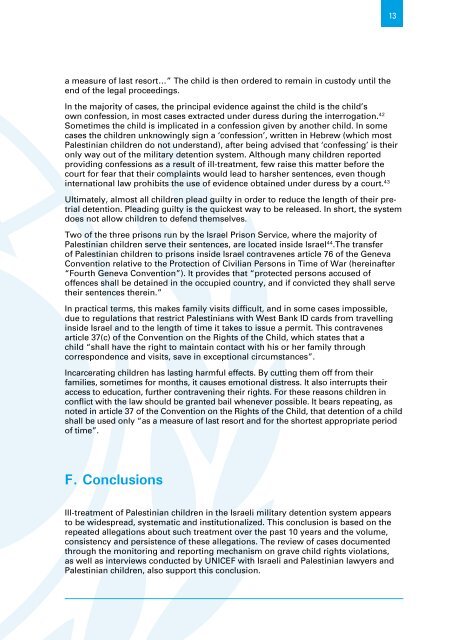Children in israeli Military detention
Children in israeli Military detention
Children in israeli Military detention
Create successful ePaper yourself
Turn your PDF publications into a flip-book with our unique Google optimized e-Paper software.
a measure of last resort…” The child is then ordered to rema<strong>in</strong> <strong>in</strong> custody until the<br />
end of the legal proceed<strong>in</strong>gs.<br />
In the majority of cases, the pr<strong>in</strong>cipal evidence aga<strong>in</strong>st the child is the child’s<br />
own confession, <strong>in</strong> most cases extracted under duress dur<strong>in</strong>g the <strong>in</strong>terrogation. 42<br />
Sometimes the child is implicated <strong>in</strong> a confession given by another child. In some<br />
cases the children unknow<strong>in</strong>gly sign a ‘confession’, written <strong>in</strong> Hebrew (which most<br />
Palest<strong>in</strong>ian children do not understand), after be<strong>in</strong>g advised that ‘confess<strong>in</strong>g’ is their<br />
only way out of the military <strong>detention</strong> system. Although many children reported<br />
provid<strong>in</strong>g confessions as a result of ill-treatment, few raise this matter before the<br />
court for fear that their compla<strong>in</strong>ts would lead to harsher sentences, even though<br />
<strong>in</strong>ternational law prohibits the use of evidence obta<strong>in</strong>ed under duress by a court. 43<br />
Ultimately, almost all children plead guilty <strong>in</strong> order to reduce the length of their pretrial<br />
<strong>detention</strong>. Plead<strong>in</strong>g guilty is the quickest way to be released. In short, the system<br />
does not allow children to defend themselves.<br />
Two of the three prisons run by the Israel Prison Service, where the majority of<br />
Palest<strong>in</strong>ian children serve their sentences, are located <strong>in</strong>side Israel 44 .The transfer<br />
of Palest<strong>in</strong>ian children to prisons <strong>in</strong>side Israel contravenes article 76 of the Geneva<br />
Convention relative to the Protection of Civilian Persons <strong>in</strong> Time of War (here<strong>in</strong>after<br />
“Fourth Geneva Convention”). It provides that “protected persons accused of<br />
offences shall be deta<strong>in</strong>ed <strong>in</strong> the occupied country, and if convicted they shall serve<br />
their sentences there<strong>in</strong>.”<br />
In practical terms, this makes family visits difficult, and <strong>in</strong> some cases impossible,<br />
due to regulations that restrict Palest<strong>in</strong>ians with West Bank ID cards from travell<strong>in</strong>g<br />
<strong>in</strong>side Israel and to the length of time it takes to issue a permit. This contravenes<br />
article 37(c) of the Convention on the Rights of the Child, which states that a<br />
child “shall have the right to ma<strong>in</strong>ta<strong>in</strong> contact with his or her family through<br />
correspondence and visits, save <strong>in</strong> exceptional circumstances”.<br />
Incarcerat<strong>in</strong>g children has last<strong>in</strong>g harmful effects. By cutt<strong>in</strong>g them off from their<br />
families, sometimes for months, it causes emotional distress. It also <strong>in</strong>terrupts their<br />
access to education, further contraven<strong>in</strong>g their rights. For these reasons children <strong>in</strong><br />
conflict with the law should be granted bail whenever possible. It bears repeat<strong>in</strong>g, as<br />
noted <strong>in</strong> article 37 of the Convention on the Rights of the Child, that <strong>detention</strong> of a child<br />
shall be used only “as a measure of last resort and for the shortest appropriate period<br />
of time”.<br />
F. Conclusions<br />
Ill-treatment of Palest<strong>in</strong>ian children <strong>in</strong> the Israeli military <strong>detention</strong> system appears<br />
to be widespread, systematic and <strong>in</strong>stitutionalized. This conclusion is based on the<br />
repeated allegations about such treatment over the past 10 years and the volume,<br />
consistency and persistence of these allegations. The review of cases documented<br />
through the monitor<strong>in</strong>g and report<strong>in</strong>g mechanism on grave child rights violations,<br />
as well as <strong>in</strong>terviews conducted by UNICEF with Israeli and Palest<strong>in</strong>ian lawyers and<br />
Palest<strong>in</strong>ian children, also support this conclusion.<br />
13


